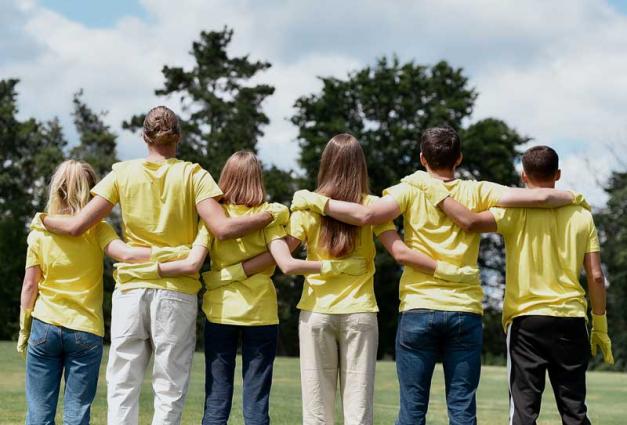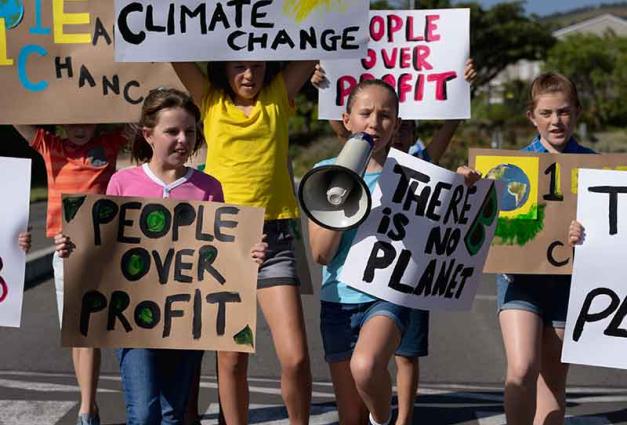Climate Change is an Existential Threat to Life on our Planet. Why Aren’t We Doing More About It?
Despite overwhelming evidence that climate change is real and is a genuine and imminent threat to human life on earth, drastic action has yet to be taken. Why is that? How can human beings ignore a threat to their very existence? We asked experts in social and personality psychology to weigh in on this.
Our experts suggested eight psychological processes that are keeping us from confronting climate change.
1. Why aren’t we confronting climate change? People are very good at blocking out threatening information.
Dr. Alison Ledgerwood from the University of California-Davis reminds us that, ironically, the ominous situation we are in with the climate may be just what is keeping people from doing more to save the planet. Classic research on persuasion suggests that when people are afraid, they tend to shut down, tune out, and ignore messages about dangerous threat. So a giant threat like climate change may lead to a strong motivation to ignore that threat so that it doesn’t overwhelm us.
Dr. Hannah Hamilton of Kenyon College points out that the fear caused by pondering climate change can be particularly powerful because people feel so little control over the outcome. Because one person cannot fix the problem alone, and just one action is not enough, people are particularly likely to freeze up and ignore the problem. That all-or-nothing mentality may lead people to give up. One way people may ignore the problem is to decide that it is just a hoax or has been greatly exaggerated. Dr. Allen McConnell points out that, if people are motivated to believe that climate change is a hoax (because to believe otherwise would be too frightening), research suggests they will see the science supporting climate change as flawed rather than compelling. That way they can ignore the threat and feel better without taking any action.
2. Why aren’t we confronting climate change? Our optimistic nature works against us.
According to Dr. Robert Gifford of the University of Victoria, the optimistic bias most humans have may be working against us in the case of confronting climate change. Research shows that people have optimistic biases: we underestimate the likelihood that bad things will happen to us and overestimate the likelihood that good thing will happen. Oddly enough, these biases tend to be healthy; they keep us from worrying too much and sometimes help us keep working even when the odds are against us. However, in the case of climate change, these optimistic biases may be working against us. That is because they lead people to assume that all will be well without them needing to act. Thus, our optimistic nature gets in the way of action.
3. Why aren’t we confronting climate change? People have a hard time putting long term goals ahead of short term wants.
Dr. Allen McConnell of Miami University suggests that one psychological principle that undercuts our ability to effectively engage climate change is the challenge of putting our long-term goals ahead of our short-term goals. Research has shown that people have a tough time doing what is best for themselves in the long term when it conflicts with what they want in the short term. Ask anyone who has tried to diet when delicious food is available or attempted to save money when a tempting shopping opportunity arose. Even when you know what is best for you in the long run, you often don’t do it. Confronting climate change means making short term sacrifices (such as giving up driving one's own car to work in order to carpool) for long-term benefits (carpooling reduces greenhouse gases), and that is hard to do. It is much easier and far more tempting to behave selfishly than to do what's best for the long-term health of the environment.
4. Why aren’t we confronting climate change? People have a hard time seeing the cause and effect.
Dr. Allen McConnell also points out that climate change is tough for people to wrap their heads around because the outcomes do not happen right after the causes. Seeing cause-and-effect connections is always hard, and climate change presents a number of conditions that makes it even more difficult. For example, global warming's causes and consequences are often separated by centuries. (Increases in greenhouse gases during the Industrial Revolution will lead to the Maldives being destroyed in the 21st century.) Moreover, not only is there a greater gap in time between cause and effect with global warming, there is a gap in proximity too. For example, it's easier to accept that pollution in China affects the health of the Chinese people than it is to accept that pollution in China is melting the ice in Greenland. Thus, the global nature of climate change makes seeing cause and effect more challenging. Because people don’t directly see one thing causing another, they are skeptical that humans are causing climate change.
5. Why aren’t we confronting climate change? People see climate change as a partisan issue.
We all know how divided our political world has become. Unfortunately, those divisions are keeping us from confronting climate change. Research by Dr. Phillip Ehret of California State University-San Marcos and his colleagues suggests that some people see climate change as a partisan issue and, thus, see changing their attitudes (or behavior) as giving in to the “other” side. In their study, the researchers varied whether participants saw Democratic support and Republican opposition or saw Republican support and Democratic opposition to climate change issues. They found that people were heavily swayed by which set of endorsements they saw in the study. In other words, people aren’t just evaluating information when they get it. They see climate change as a partisan issue, so they are suspicious of any information that comes from someone not in their party.
Dr. Daniel W. Barrett of Western Connecticut State University points out that each side thinks (falsely) that the other is unwilling to change their views and that their political peers are unwilling to cooperate with the opposing party. These exaggerated perceptions of political division serve to increase ongoing political conflict and division, decreasing our ability to change people’s minds about climate change. No one wants to give into the “other” side.
6. Why aren’t we confronting climate change? Worries about the effects on our economic system lead people to deny climate change.
Dr. John Jost of New York University points out that some people discount climate change because addressing the problem would mean changing things about our current economic system, and they don’t want to do that. He studied people who have a tendency to judge the economic system [and even inequality in the economic system] as legitimate and fair. Those people are high in what Dr. Jost calls “economic system justification.” He and his students found that economic system justification contributes to skepticism about climate change. People who are high in economic system justification think about information about climate change in a biased fashion, leading them to minimize problems associated with climate change. In other words, when people want to maintain the current economic system, they ignore scientific data that shows that climate change is manmade and focus instead on other factors. However, Jost and his colleagues also found that if you make those people feel like the economic system is strong, the bias goes away. If people think the current economic system can withstand the changes that are needed to fight climate change, all of a sudden climate change seems more compelling.
7. Why aren’t we confronting climate change? Some people don’t trust science.
Dr. Ken DeMarree of SUNY Buffalo points out that some people are skeptical about climate change because they are skeptical about science. Perhaps they are skeptical after spending years hearing that fat is bad for people then hearing it is good (or that sugar is good for them, and then it is bad). Instead of accepting that scientific knowledge advances incrementally (or that reports of science in the press are sometimes not accurate), they discount science and scientists as unreliable. Indeed, research shows that people’s general beliefs about scientists predict specific scientific beliefs, including beliefs related to climate change. In other words, people who are skeptical about scientists tend to be skeptical about climate change.
8. Why aren’t we confronting climate change? Seeing humans as dominant over the enviroment makes people less likely to believe in climate change.
Dr. Kirsti M. Jylhä of the University of Kent points out that some people strongly believe in human dominance over nature, and those people are less likely to believe in climate change and less likely to act to alter its effects. The idea that human beings play a special and unique (and better) role in world is hard to reconcile with the idea that human activity may be destroying the world. People with these beliefs tend to look at reports of suffering going on around the world as a result of climate change and feel very little empathy. They also tend to be very skeptical about the role of humans in causing climate changes. Thus, ironically, the commonly held idea that human beings have a special place on the earth may be one of the reasons that people are not working harder to save their home.
In summary, psychologists have identified many psychological processes that are at work as people confront (or fail to confront) climate change. First, we are very skilled at blocking out information that is too scary for us, so we may ignore climate change to avoid the fear it causes. Second, our natural optimism leads us to assume that everything will work out without us having to do anything. Third, it is human nature to favor our short term wants over our long term needs, which leads us to not change our behavior for the future of the earth. Fourth, it is difficult to understand the complex cause and effect structure of climate change, which leads people to doubt whether it really is caused by human activity. Fifth, distrust of science and scientists leads some people to question whether climate change is real. Sixth, we see climate change as a partisan issue, which makes some people uneasy about changing their attitudes and behaviors because it means agreeing with “them.” Seventh, people with a stake in our current economic system are motivated to avoid making changes that would alter that system. And finally, the belief that humans have a special—and exalted—place on the earth is incongruent with the idea that humans are destroying the planet, thus leading to skepticism about the human role in climate change. When you consider all of those factors together, it is not surprising that people are doing such a poor job confronting the climate crisis: there are so many things keeping us from doing so!
Note: Social and Personality Psychologists have also found reason to be hopeful about our ability to confront climate change. You can find more details in this post.
About the Author
Shira Gabriel is an Associate Professor at SUNY Buffalo, the Editor of the journal Self & Identity, and an Associate Editor of the SPSP Character & Context blog.




